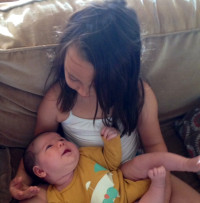 Last fall, my husband and I had some news which we thought would be exciting for our six-year-old daughter, but the conversation didn’t turn out the way we planned.
Last fall, my husband and I had some news which we thought would be exciting for our six-year-old daughter, but the conversation didn’t turn out the way we planned.
The three of us sat down at the dinner table, and I said with a smile, “Honey, we have something we want to tell you. I’m pregnant. It looks like you’re going to have a baby sister.”
Her face fell, and she immediately started crying. “This is the worst day ever!” she yelled, and she ran out of the room.
We should have expected something of this nature. The previous year, I had had a second-trimester miscarriage, and that was confusing for my daughter, who had witnessed some of my deep grief.
We had many conversations about her brother who died.
However, in the following days and weeks, we didn’t see her express much overt sadness about what had happened.
Now, after this new announcement, I went to my daughter in her room and sat with her for a while, as she first raged and later cried. It was a big, big cry, without many accompanying words. I can’t know what was wrapped up in it, but I imagine that she was offloading some of her emotional experience from the previous year, as well as maybe things from other parts of her life.
What’s important is that she released a lot through this cry.
I held her loosely in my arms and reassured her of my love and support for her.
When she finished crying, my daughter was calm and peaceful. She asked what the baby’s name would be. I said, “I don’t know. Do you have any ideas?” She suggested “Ariel” and “Belle” (yes, like the princesses).
I knew then that, for the time being, my daughter was done releasing tough feelings.
As my belly grew, my daughter was the biggest fan of my pregnancy. She talked to the baby inside, often kissing her good night. She picked out board books and toys for her sister, talked easily about the coming changes with family and friends, and volunteered that she would help out with the baby’s needs, except for changing diapers because “that’s gross!”
Now, with her newborn sis (who is not named after a princess), my six-year-old is phenomenal.
Sure, we can see her grappling with the decreased parental attention (thank goodness for Special Time—and, when needed, Staylistening). But, all in all, the transition in our family has been smooth. I know my daughters are just at the beginning of their sibling journey, and that there are sure to be hard spots ahead. That said, I am so grateful we are all starting from an emotionally healthy and grounded place, and that we have these listening tools to help us stay as connected as possible in our way forward.
Are you looking for more tips on how to help siblings get along?
In our self-guided video course, Taming Sibling Rivalry, you will build the skills and understanding to truly mend your children’s relationships with one another, and with you. You'll learn what to do when chaos ensues, how to handle the most common sibling struggles, the secret to sibling friendships, and much more!